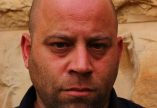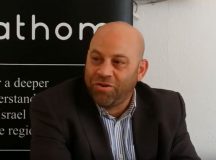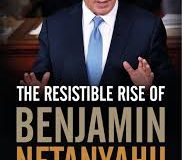Back in 2017, I sat with a group of Israeli colleagues in a small hotel conference room in a European capital, listening to Benjamin Netanyahu give the customary media briefing at the end of one of his foreign trips. To one reporter’s question on whether a certain issue had come up in Netanyahu’s meeting with his local counterpart, he answered, ‘I’ll keep the answer to that for my memoirs.’ And after a brief pause, he added with a smile, ‘which I intend to write many years from now.’
Five years later, Netanyahu has now written his memoirs, published simultaneously in English and Hebrew, and we still don’t know what was said at that meeting, but that’s not surprising. In the big scheme of Netanyahu’s 73 years of life, it probably wasn’t that important to begin with. But reading Bibi: My Life, I kept thinking of the second part of Netanyahu’s answer. He didn’t intend to publish this book in 2022. What he calls ‘the hiatus’ that allowed him to write the book in nine months of feverish scribbling was unplanned. If it had been up to him, he certainly wouldn’t have had the hiatus.
Despite the book’s name, he isn’t quite ready to sum up his life or career. At an age (Netanyahu will be the oldest member of the new Knesset to be elected on November 1) when most men have either retired or are planning their retirement, he is not only anxious to get back into office, but has rejected suggestions by Likud campaign advisors that he announce that should he win, this will be his last term as prime minister.
That’s not to say that at some points over the last sixteen months during which Netanyahu has been working on the book (he updated parts of it until very close to publication) he wasn’t less than convinced that he would make it back in office. Those who met him in unguarded moments during part of that time speak of a ‘dark period’ where he was at a loss. One former member of his retinue told me that ‘he just couldn’t get used to not being surrounded by an army of aides. I was asked to go in and keep him company at home.’ Another person who was in frequent contact told me of having ‘routine phone-calls that should have lasted only a few minutes which went on for over an hour of rambling.’
There was certainly a point towards the end of 2021, when the new Bennett-Lapid government which had seemed so precarious from the start, looked like it may actually survive a while longer, after passing the state budget in November, when Netanyahu instructed his lawyers to start negotiations with the attorney-general over a possible plea bargain. That would have meant him receiving a reduced sentence in his long-going corruption case which at the very least would have barred him from running again for office for years to come. But the talks came to nothing and then the government lost its majority in early April and things began to look a lot different.
But most, if not all the manuscript had been written by then and in parts, it seems to have been therapeutic for Netanyahu, as if he was both establishing his legacy and place of history, but also convincing himself, not just the readers, that he remains Israel’s essential leader.
Netanyahu is the rare politician who never goes off-message. Nearly every politician, once you switch off the cameras and recording devices and close the reporter’s notebook, allow themselves to relax and switch out of campaigning mode. That’s when you might hear from them a few revealing words or see a different character, which sadly you can’t use in your reports. With Netanyahu that rarely if ever happens. His off-record persona is nearly identical to his on-record. He has the rare ability to fully convince himself of his political message, even if the message has changed. And his book reflects that perfectly.
There are few new or surprising details in it. Netanyahu’s life has already been reported on in minute detail by the Israeli media and been the subject of half a dozen biographies already. And yet, in his telling it is still a fascinating story of the meteoric rise of a boy who spent his childhood split between Jerusalem and various American cities. His five years of military service in the most elite of Israeli combat units, followed by his years at the Massachusetts Institute of Technology. Then the death in Entebbe of his elder brother Yoni and a few years in which he seems to have gone astray, not quite finding himself in the business world either in the U.S. or Israel. Until he got the unexpected offer to become Israel’s deputy ambassador in Washington at the age of 32, making him an almost overnight media star and launching his breathtaking public career.
But there is something unnerving about reading his book as well, unless you are a total admirer who can see no faults in the man. Every anecdote along the way, major or minor, is there to serve a single purpose: to convince the reader that nearly every decision he made was right and that the experience gained and skills acquired over seven decades, all the way back to his primary school homework, served to build him as the most consummate and immaculate, and overall essential leader for Israel. In fact, he tells us, in extensive chapters, that he was being prepared for the role even before he was born, through the lives of his father and grandfather, who just like him were all-knowing and ever-prescient Zionist thinkers and advocates.
I don’t think I’ve read a political autobiography that manages simultaneously to be so interesting and eloquent and yet so self-serving. It’s both packed with detail and strictly economical with inconvenient and embarrassing truths. Just like the man, highly intelligent and knowledgeable, but devoid of any true regret or retrospection. This is Netanyahu both as he sees himself and as he wants to be seen by others. They are one and the same.
Ultimately it doesn’t matter whether Netanyahu wrote this book as his version of history, or as a campaign pitch to Israelis about to vote on November 1. For better or worse, he is as reliable a historian as he is a politician.





































